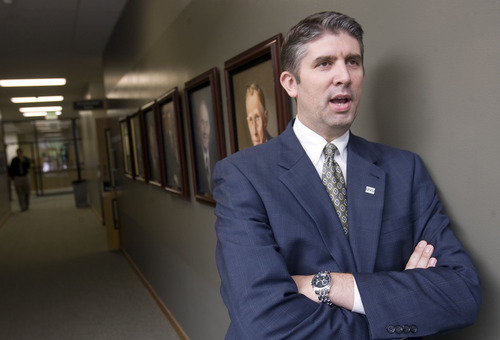This is an archived article that was published on sltrib.com in 2012, and information in the article may be outdated. It is provided only for personal research purposes and may not be reprinted.
Anticipating a boost in tax revenues next fiscal year, Utah Gov. Gary Herbert is calling for a 1 percent increase in compensation for state employees — except those who work for colleges and universities.
Higher education officials and business leaders are concerned that campuses could see an exodus of top faculty and staff, now experiencing their third year of frozen pay.
University presidents pleaded with legislators this week to raise pay for higher ed, calling it their highest funding priority this session and a critical investment if Utah is to meet its goal of having 66 percent of the workforce holding a post-secondary credential.
"For years my folks have been doing more with less while their budgets are cut, and taking thousands more students, and teaching labs from 10 a.m. until midnight. Then to be told they don't matter like other state employees — it was demoralizing," Utah Valley University President Matthew Holland recently told the Higher Education Appropriations Subcommittee.
The governor's proposed budget calls for increasing higher education spending by only $16 million, while according greater generosity to K-12 education.
"We would have liked to fund increased compensation across the board — there are certainly many in higher education who are very deserving — but we simply have limited available funds and more demands than could be met," said an email from Herbert's spokeswoman, Ally Isom. "While higher education has built in pay increases the past few years, our public employees and public educators have not had pay increases. Public education is a constitutionally mandated priority so we did what we could."
Some committee members are sympathetic to Holland's plea, and question whether the proposed 1 percent bump is adequate.
"It's woefully underemphasized," said Sen. Ross Romero, D-Salt Lake City. "A 1 percent increase is not even going to cover their pension plans and insurance premium increases."
Colleges and universities are allowed to hike tuition to fund compensation increases, but only Southern Utah University has done so in recent years. The Cedar City school, which has retooled its mission with an emphasis on liberal arts and sciences, established 20 new faculty positions under this year's steep tuition hike, President Michael Benson told the committee. Yet SUU remains a bargain relative to similar colleges.
Most other Utah schools are loath to rely on tuition for raises, particularly those that offer lots of two-year degree programs, such as UVU and Salt Lake Community College.
"If we did that every year and that becomes the solution, we are going to steadily price students out of the market," Holland said in an interview. "This doesn't seem to be the time to add a greater burden on students."
Meanwhile, Utah tuition has steadily risen to help make up for declines in state spending on higher education while covering rising costs. Since 2008, when tax revenues began dropping, state expenditures have declined by $1,555 per full-time student, according to the Utah System of Higher Education. The drop was due to increasing enrollments, not just budget cuts.
So many students have flooded UVU's Orem campus, which has by far the least classroom space per student, that its enrollment reached a "soft cap." Holland estimates 1,700 students this year "peeled off" because they couldn't get the classes they needed, even though UVU has opened hundreds of course sections on evenings and weekends, and put many more online.
"Those are 1,700 kids in Utah Valley who are not in higher education because we couldn't accommodate the demand," he said. "We are operating around the clock to make sure we use the physical facilities as optimally as possible."
While there is much concern about student success and employability after graduation, compensation remains a sensitive issue in higher education. The state Board of Regents recently approved presidential pay raises, which Holland and others vowed to donate to scholarships. When the raises were rescinded under political pressure, Holland cut a check anyway to endow a fund for students committed to teaching careers.
Extending the 1 percent pay hike to higher education employees would cost taxpayers $6.7 million, according to David Buhler, associate commissioner of higher education. Higher ed's budget request totals $62 million in new funding, or an 8 percent increase, nearly four times what Herbert proposes. Included in that are requests to cover mission-based performance funding, past enrollment growth, maintenance costs on non-state funded buildings, system-wide programs such as the Regents' scholarships, and $5 million for retention raises.
"Professors have offers on the table. We have to show some willingness to keep them," Buhler told the appropriations subcommittee. The state Board of Regents is also seeking $50 million to upgrade the University of Utah's crumbling hot-water and electrical distribution systems.
"I have teaching labs where water is spraying out of pipes and classrooms where lights are going off," said U. president-elect David Pershing. "We spent $50 million over the last five years on this problem. It's so big we can't handle it."



